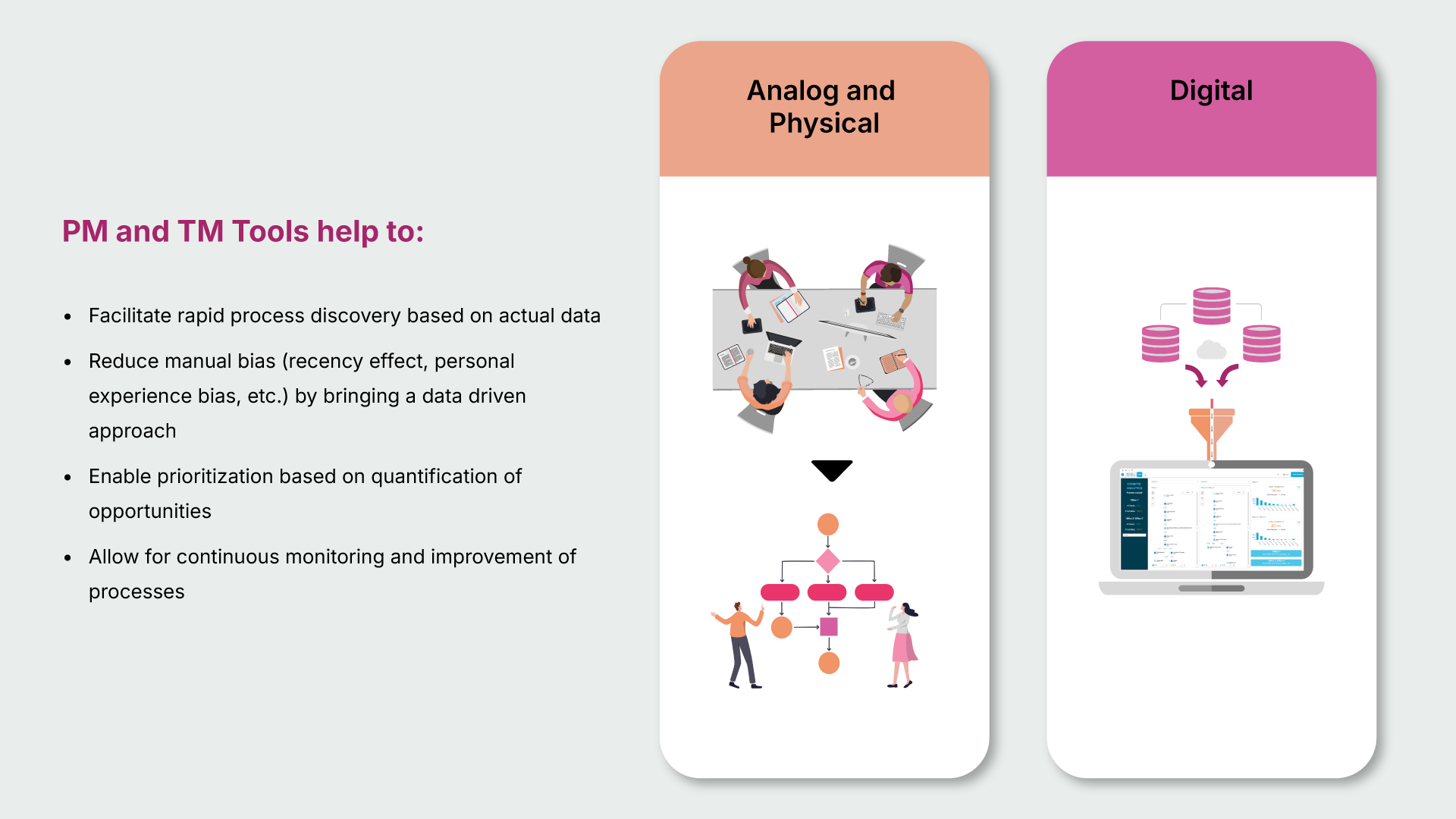
CXO’s Guide to Process Intelligence: Unlocking Operational Excellence
- Published Date: August 1, 2025
In today’s rapidly evolving business landscape, the ability to understand, optimize, and transform operations is paramount. For CXOs, navigating this complexity requires more than just hindsight; it demands foresight and real-time insights into the very fabric of business: its processes. This is where process intelligence emerges as a game-changer, offering a distinct advantage over traditional analytical approaches.
Why Process Intelligence Matters for CXOs
At its core, process intelligence provides a comprehensive, data-driven understanding of how your business processes truly operate, from end to end. Unlike traditional reporting that often shows “what happened,” process intelligence dives deep into “how” and “why” things are happening. It achieves this by collecting data from various systems (ERPs, CRMs, and even unstructured sources) and transforming it into dynamic digital representations of your workflows using advanced techniques like process/task mining.
For CXOs, this granular visibility is invaluable. It enables data-driven decision-making, moving beyond assumptions to pinpoint hidden inefficiencies, bottlenecks, and areas of high friction within existing processes. This isn’t just about minor tweaks; it’s about uncovering significant opportunities for value creation and operational improvement that directly impact the bottom line and customer experience.
Process Intelligence: A Catalyst for Business Transformation
Process intelligence is not merely an analytical tool; it’s a powerful enabler of business transformation and digital transformation insights. By providing a clear, unbiased view of process execution, it empowers organizations to:
- Identify and Prioritize Optimization Opportunities: With a detailed map of current processes, CXOs can spot inefficiencies, rework loops, and compliance gaps. This clarity allows for strategic prioritization of process improvements with the highest impact.
- Facilitate Targeted Automation: Understanding the precise steps and variations within a process allows for intelligent and strategic automation. Process intelligence helps identify which workflows are most suitable for robotic process automation (RPA) or agentic AI-driven solutions, ensuring automation efforts yield maximum returns.
- Enhance Performance Monitoring and Continuous Improvement: Process intelligence platforms offer real-time monitoring capabilities, allowing organizations to track process performance against KPIs and quickly detect deviations from expected behavior. This fosters a culture of continuous improvement, ensuring processes evolve in tandem with business needs.
- Break Down Organizational Silos: By creating a shared, data-backed visualization of cross-functional processes, process intelligence promotes collaboration and alignment among teams, leading to more cohesive and efficient operations.
Process Intelligence vs. Traditional Business Intelligence (BI)
While both process intelligence and traditional business intelligence (BI) leverage data to provide insights, their focus and approach differ significantly. Understanding this distinction is crucial for CXOs:
Feature | Process Intelligence | Traditional Business Intelligence |
Primary Focus | Analysis and optimization of end-to-end business processes. | Holistic view of organizational performance, market trends, KPIs. |
Questions Answered | “How” and “Why” things happen in processes; “Where” improvements can be made. | “What” happened; “How” has performance changed over time. |
Data Granularity | Deep, event-level operational data from various systems. | Aggregated, structured data for reporting and dashboards. |
Output | Actionable insights for process redesign, automation, and optimization. | Reports, dashboards, and visualizations for strategic decision-making. |
Goal | To continuously improve operational efficiency and effectiveness. | To monitor business health and identify trends. |
Conclusion
In essence, while BI tells you what is happening at a strategic level (e.g., customer satisfaction is down), process intelligence explains why it’s happening by revealing the underlying operational inefficiencies (e.g., specific delays in customer service workflows). They are not rivals but complementary forces; process intelligence can validate and calibrate BI metrics, providing the granular detail needed to act on strategic insights.
Embracing process intelligence is a strategic imperative. It offers the depth of insight required to truly optimize operations, drive meaningful business transformation, and stay ahead in a competitive market. By combining the “what” of BI with the “how” and “why” of process intelligence, organizations can achieve unparalleled operational excellence and unlock their full potential.

We’re Not Software Vendors.
We’re Your Transformation Partners.
At Cognitio Analytics, we go beyond static dashboards and one-off reports. Our Process Intelligence solutions deliver real-time, end-to-end visibility into how your business actually operates—empowering CXOs to uncover inefficiencies, drive intelligent automation, and lead with confidence.
Unlock the strategic clarity needed to fuel true operational transformation—backed by experts who walk the journey with you.
Conclusion
In essence, while BI tells you what is happening at a strategic level (e.g., customer satisfaction is down), process intelligence explains why it’s happening by revealing the underlying operational inefficiencies (e.g., specific delays in customer service workflows). They are not rivals but complementary forces; process intelligence can validate and calibrate BI metrics, providing the granular detail needed to act on strategic insights.
Embracing process intelligence is a strategic imperative. It offers the depth of insight required to truly optimize operations, drive meaningful business transformation, and stay ahead in a competitive market. By combining the “what” of BI with the “how” and “why” of process intelligence, organizations can achieve unparalleled operational excellence and unlock their full potential.
Explore the Latest
Discover trends and strategies shaping smarter, faster business processes.




